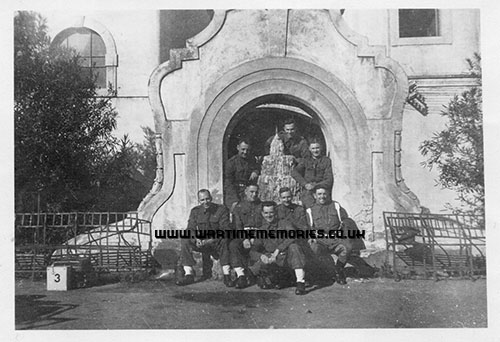After his call-up, Harry Smith started his training at Maidstone.
His wife was pregnant with their first child at the time and Harry suffered from morning sickness. He claimed this was the only time he saw the RSM laugh.
He was particularly proud of having been subjected to physical training under Stan Cullis, a famous footballer who was highly critical of his football skills.
He was subsequently trained as a driver and dispatch rider at Catterick, Yorkshire. (He was already able to drive having owned his own car before the war.) He was put in charge of a group of 6 who collected newly landed Jeeps from Glasgow and drove them to Liverpool for embarkation to North Africa. On the way south it rained heavily and he had to find a forge where they could drill holes in the floor so they didn't have to drive with their feet in water.
He travelled on a troopship from Liverpool to Algiers. The ship carried six thousand soldiers many of whom including Harry slept on deck. They travelled in convoy far out into the Atlantic before turning back for North Africa in order to avoid U-boats and air attacks but in spite of that, he recalled that several ships blew up and sank, sometimes in the night. The convoy didn't stop.
He landed somewhere around Algiers as part of the 1st Army in Operation Torch). The 1st Army was disbanded after the victory in Tunisia in 1943 after which he was part of the 8th Army.
I am fairly sure that at various times he was in Algiers, Bizerte, Tunis, Tripoli, Benghazi, Tobruk, Sidi Barrani, Mersa Matruh and Alexandria.
He told a story of driving a truck with faulty steering (a broken tie rod) along a stretch of road known as Messerschmidt Alley, because it was straight with desert either side so that German aircraft could easily attack traffic on the road, but because of the steering fault his truck would dart from side to side unexpectedly and so he evaded attack.
He was placed on a train in Mufti to investigate the loss of goods from the train. He found that at one point the track was on a tall curving sand embankment so shaped that although he could see goods rolling down the embankment he could see neither where on the train they were being thrown from nor where they finished up at the bottom of the slope.
He was part of the invasion of Sicily but talked little about this apart from having attended an opera performance in an ancient amphitheatre.
He was landed in Italy, either Anzio or Salerno (probably Salerno). He told of a day when all 30,000 soldiers in the beachhead were told to strip and wash in the sea for lack of other facilities.
He ended the war in Rome and was appointed condottore.
He returned home in about September 1945. For some time after his return he slept on the floor because a bed was too soft.
In North Africa he contracted malaria from which he suffered recurring bouts during my childhood.




